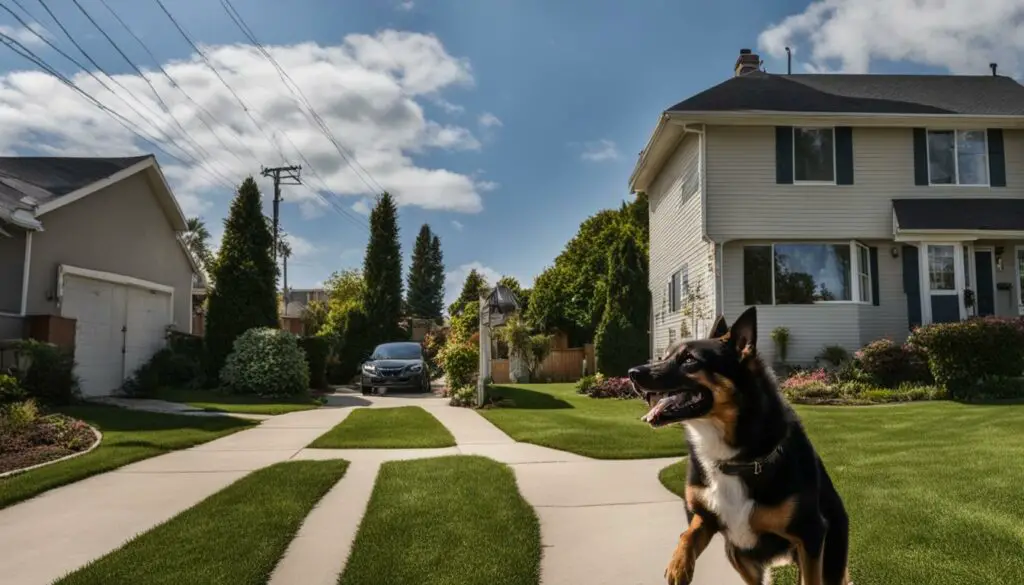Being charged by a neighbor’s dog on your own property can be a frightening experience. It’s important to prioritize your safety and understand your legal rights in such incidents. In this guide, I will provide solutions, legal advice, and tips for ensuring your safety when dealing with these situations.
Key Takeaways:
- Stay calm and find a secure location if a neighbor’s dog charges you on your property.
- Document the incident, including the date, time, and any injuries or damages.
- Approach your neighbor in a friendly and non-confrontational manner to address the issue.
- Research local regulations and animal control laws to understand your rights and seek guidance if needed.
- Enhance security measures on your property to prevent further incidents.
Understanding the Incident: Details and Concerns
In one instance, a neighbor’s aggressive Pit Bull mix, who is often left outside unsupervised, charged me multiple times on my own property. The dog’s behavior was undeniably aggressive, and I felt unsafe in my own home. This incident raises serious concerns about dealing with aggressive dogs, neighbor disputes, and the potential dangers of dog attacks on private property.
I am unsure how to address this issue with my neighbor, as speaking to them directly might put me at risk of another attack. It is alarming to think that I may not have legal rights to protect myself and ensure my safety on my own property. This situation has left me feeling helpless and in need of guidance on how to handle such incidents.
“Being charged by a neighbor’s dog on your own property can be a frightening experience. It is crucial to understand your legal rights as a property owner when dealing with neighbor’s dogs on your property. Laws regarding dog ownership and property boundaries can vary by state and locality. However, in many cases, property owners have the right to protect their property and ensure their own safety.”
– Legal professional specializing in animal law

Understanding the Incident: Details and Concerns
Legal Rights for Property Owners
As a property owner, it is important to be aware of your legal rights when dealing with neighbor’s dogs on your property. The laws regarding dog ownership and property boundaries can vary depending on your state and local regulations. However, in many cases, you have the right to protect your property and ensure your own safety.
Consulting with local authorities and legal professionals can help you understand the specific regulations in your area and explore potential solutions. It is crucial to be well-informed about your rights and responsibilities as a property owner to effectively address the issue of a neighbor’s dog trespassing on your property.
If you find yourself in a situation where a neighbor’s dog is regularly entering your property without permission, consider reaching out to local authorities or animal control. They can provide guidance on how to handle the situation and ensure that the dog’s owner is aware of their responsibilities.
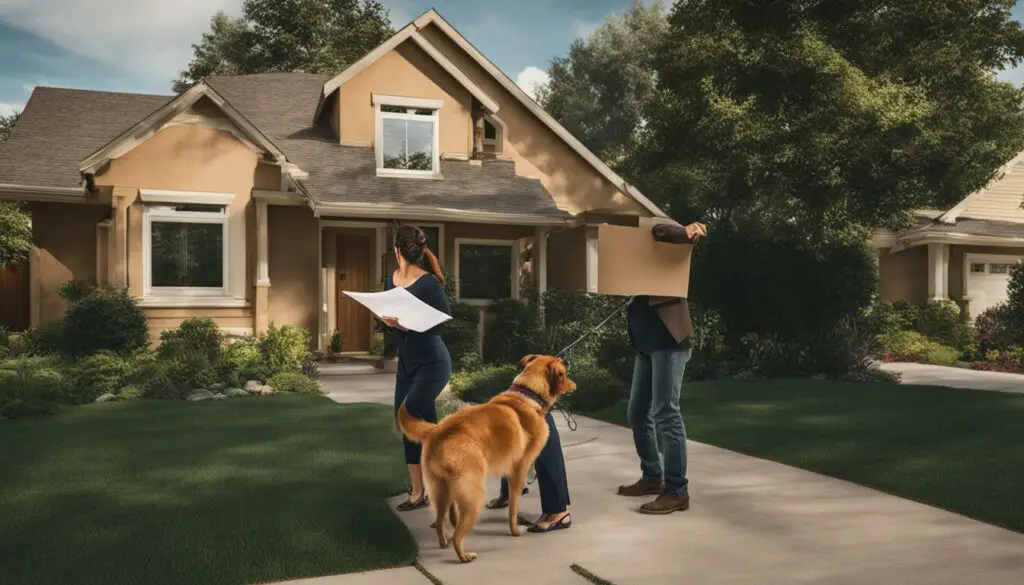
Understanding Property Boundaries
One essential aspect to consider when dealing with neighbor’s dogs on your property is property boundaries. Understanding where your property begins and ends will help you determine if the dog is trespassing. If you are unsure about the exact property boundaries, you may want to consult a land surveyor or refer to the property’s deed and plat map.
Being familiar with property boundaries can provide you with a clear legal standpoint if you need to take further action to prevent the neighbor’s dog from entering your property. It is important to assert your rights and protect your property from any potential damage or harm caused by the dog.
| Legal Rights for Property Owners: | Dealing with Aggressive Neighbors: | Neighbor’s Dog Trespassing: |
|---|---|---|
| Understand your legal rights | Communicate effectively and respectfully | Report the incident to local authorities if necessary |
| Consult with local authorities and legal professionals | Seek mediation or legal intervention if needed | Ensure your property boundaries are clearly defined |
| Take necessary steps to protect your property | Consider enhancing security measures on your property | Encourage responsible pet ownership in the community |
By understanding your legal rights, effectively communicating with your neighbor, and taking appropriate steps to protect your property, you can address the issue of a neighbor’s dog trespassing on your property. Remember to prioritize your safety and seek guidance from authorities or legal professionals when necessary.
Dealing with the Incident: Immediate Steps to Take
When faced with a charging dog on your property, immediate action is crucial to ensure your safety. Follow these steps to navigate the situation:
- Find a secure location: If possible, seek refuge in a sturdy structure, such as your home or a locked car. Alternatively, climb onto a high surface, like a fence or a sturdy piece of furniture, to create distance between you and the dog.
- Stay calm and avoid sudden movements: Dogs can perceive fear and react aggressively. Remain as calm as possible and try to move slowly and deliberately. Avoid making any sudden movements or running, as this may trigger the dog’s predatory instincts.
- Wait for the dog to leave: Dogs are generally curious creatures, and they may lose interest in you once they realize you are not a threat. Stay in your secure location until the dog eventually leaves your property.
- Document the incident: After the dog has left, take the time to document the incident. Note down the date, time, and any injuries or damages sustained during the encounter. This documentation can prove useful if you need to report the incident or take further action.
Remember, your safety should always be the top priority. Taking these immediate steps can help you navigate a challenging situation and ensure your well-being.
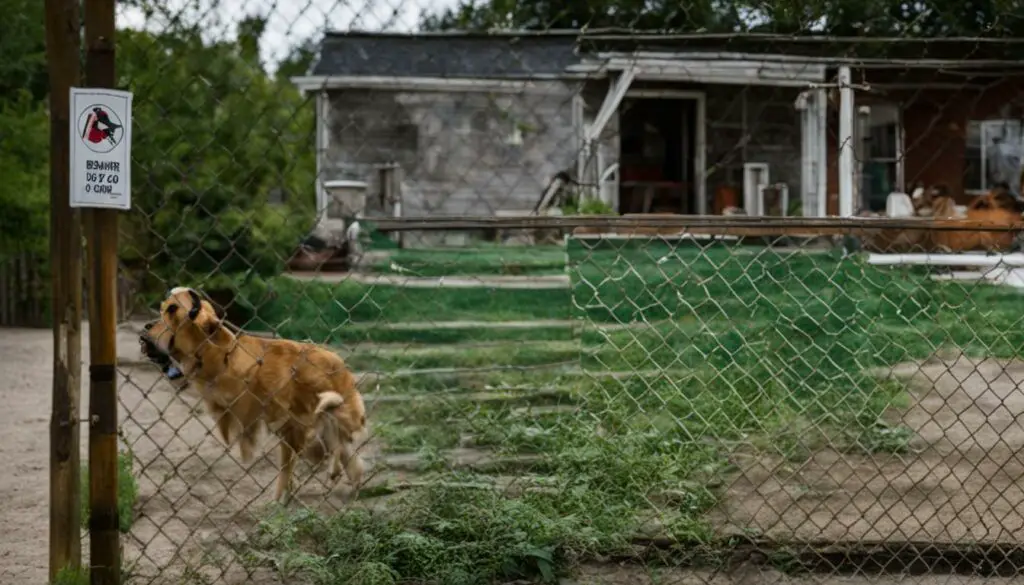
Communicating with the Neighbor
When it comes to addressing the issue of a neighbor’s dog charging onto your property, open and respectful communication is key. By approaching the neighbor in a friendly and non-confrontational manner, you can express your concerns and work towards a resolution that ensures the safety and peace of mind for everyone involved.
Start the conversation by sharing your experiences and explaining how the dog’s behavior has affected your sense of safety on your property. Emphasize that you understand that their dog may be important to them, but it is essential for all neighbors to feel secure in their own homes. Suggest potential solutions, such as asking them to keep their dog leashed or properly fenced, to prevent future incidents.
Remember to maintain a civil and respectful tone throughout the conversation. It is important not to escalate tensions or place blame. Instead, focus on finding common ground and working together towards a mutually beneficial outcome. By approaching the situation with empathy and understanding, you increase the chances of reaching a resolution that ensures the safety and wellbeing of everyone involved.
Exploring Local Regulations and Animal Control
When dealing with aggressive dogs on your property, it is crucial to understand the local regulations and your legal rights as a property owner. Each state and locality may have different laws regarding dog ownership and property boundaries, so it is important to familiarize yourself with the specific regulations in your area. By doing so, you can better navigate the situation and protect your rights.
Exploring local regulations can provide valuable insights into how to address the issue of aggressive dogs charging onto your property. Some areas may have specific leash laws that require dogs to be restrained when outside their owner’s property. Others may have ordinances that hold owners responsible for any damage caused by their dogs. By understanding these regulations, you can determine the appropriate course of action to ensure your safety.
In addition to local regulations, contacting your local animal control authorities can be a helpful step in resolving the situation. Animal control can provide guidance and assistance in dealing with aggressive dogs and neighbor disputes. They may be able to mediate the situation or enforce regulations if necessary. Their expertise and resources can help you find a resolution that addresses the issue while prioritizing everyone’s safety.
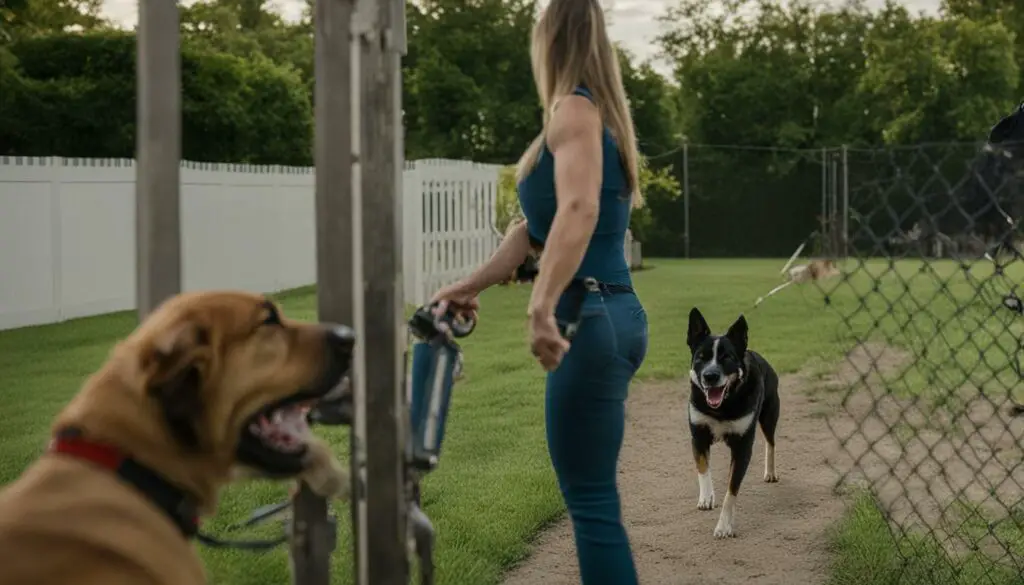
Table: Local Regulations and Penalties
| Local Area | Leash Laws | Penalties for Violation |
|---|---|---|
| City A | Requires dogs to be leashed in public areas | Fines up to $100 for unleashed dogs |
| County B | Allows dogs to be off-leash in designated areas only | First offense: warning, subsequent offenses: fines up to $250 |
| Town C | Requires dogs to be under control at all times | Fines up to $500 for dogs found to be aggressive or causing harm |
Consulting with legal professionals who specialize in property and animal law can also provide valuable insight into your legal rights as a property owner. They can help you understand the legal options available to you and guide you through the process of seeking resolution. Whether it is mediation, filing a complaint, or taking legal action, having professional advice can give you the confidence to navigate the situation effectively.
Enhancing Security Measures on Your Property
Ensuring the safety of your property is paramount when dealing with aggressive neighbors and dog incidents. By taking proactive steps to enhance security measures, you can create a safer environment for yourself and deter unauthorized access. Here are some effective strategies to consider:
- Install Security Cameras: Surveillance cameras can help monitor your property and provide evidence in case of any incidents. Place them strategically to cover key entry points and visible areas.
- Improve Fencing: Reinforce your property’s fencing to make it more secure and prevent dogs from entering. Consider sturdy materials and ensure there are no gaps or weak spots.
- Add Warning Signs: Display signs indicating private property, dog restrictions, or security measures. This can act as a deterrent and serve as a reminder to neighbors to respect boundaries.
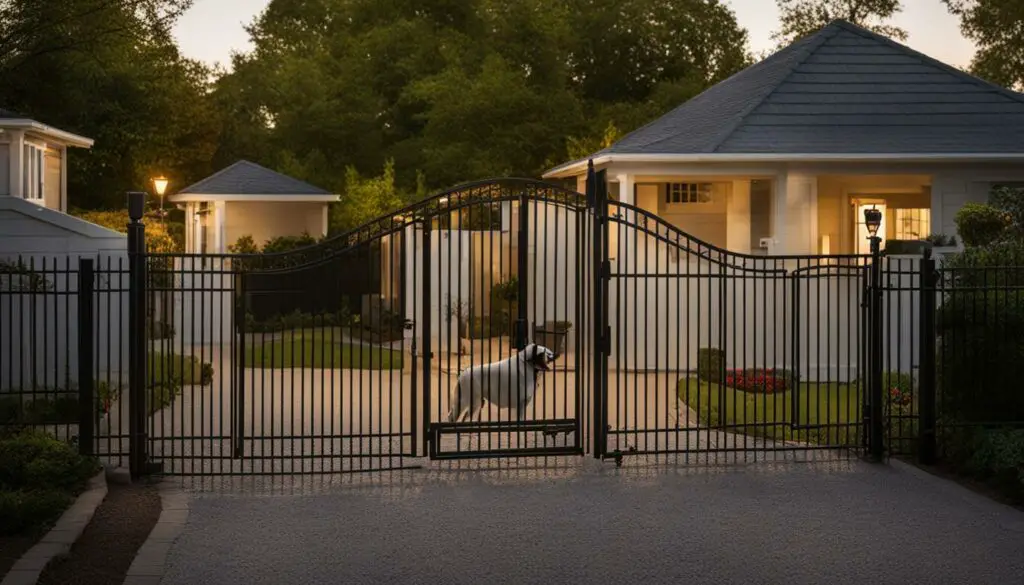
“Enhancing Security Measures on Your Property is crucial for ensuring the safety of your home.”
In addition to these physical measures, it’s essential to maintain open lines of communication and foster a sense of community. Building strong relationships with your neighbors can lead to better understanding and cooperation. By working together, you can create a harmonious neighborhood where everyone feels safe and respected.
Creating a Neighborhood Watch Program
Consider initiating a neighborhood watch program to enhance security and address concerns collectively. This program involves neighbors keeping an eye out for any suspicious activities and promptly reporting them to local authorities. Establish regular communication channels, such as a group chat or email list, to share important information and updates. By actively participating in a neighborhood watch program, you contribute to a safer community for everyone.
| Enhancing Security Measures | Benefits |
|---|---|
| Installing Security Cameras | Provides surveillance and evidence in case of incidents |
| Improving Fencing | Prevents dogs from entering your property |
| Adding Warning Signs | Acts as a visual deterrent for potential trespassers |
Seeking Mediation or Legal Intervention
When all attempts to resolve the issue with your neighbor have failed, it may be necessary to seek mediation or legal intervention to address the problem. Mediation provides an opportunity to engage in a facilitated conversation, with the assistance of a neutral third party, to find a mutually agreeable solution. This can be a useful approach when tensions are high and direct communication between parties has proven ineffective. Mediation allows for active participation and encourages open dialogue, with the goal of reaching a resolution that satisfies both parties’ concerns.
If, however, the situation escalates and your safety is at risk, consulting with an attorney who specializes in property and animal law may be necessary. They can provide guidance on potential legal actions you may take to protect yourself and your property. An attorney will be familiar with the applicable laws in your area and can help you understand your rights as a property owner. They can assist you in navigating the legal process and advocating for your safety and well-being.
It’s important to remember that seeking mediation or legal intervention should be a last resort. It’s always better to try to resolve conflicts amicably and maintain positive relationships with your neighbors. However, in cases where safety is compromised and other options have been exhausted, these measures can help ensure that your rights are protected and that you can enjoy your property without fear or distress.

| Pros of Seeking Mediation | Pros of Legal Intervention |
|---|---|
| Allows for open communication and dialogue. | Enforces legal rights and protections. |
| Potential for mutually agreeable resolution. | Guidance from legal professionals specializing in property and animal law. |
| Less adversarial and confrontational than litigation. | Increased likelihood of enforcing consequences for negligent pet owners. |
| Can help in preserving neighborly relationships. | Provides legal remedies to ensure your safety and property rights. |
Remember, seeking mediation or legal intervention should only be pursued if all other avenues have been exhausted. Your safety and well-being should always be the top priority, and it’s crucial to consult with professionals who can provide the necessary guidance and support in these situations.
Dog Safety and Dealing with Aggressive Dogs
Ensuring the safety of our dogs is paramount, especially when faced with aggressive dogs charging at us. While we can’t control the behavior of other dogs, we can take steps to protect our own pets. Proper socialization and training play a crucial role in preparing our dogs to react appropriately in such situations.
One of the key aspects of dog safety is teaching reliable recall. Training your dog to come when called can prevent potentially dangerous encounters with aggressive dogs. Additionally, improving your dog’s social skills through controlled interactions with other dogs can help them navigate various situations with confidence.
It’s important to remember that every dog is unique, and their reactions may vary. By regularly exposing your dog to different environments, people, and other animals, you can help them become well-adjusted and less likely to respond aggressively. Remember to always supervise interactions and provide positive reinforcement to encourage good behavior.
| Dog Safety Tips | |
|---|---|
| ✔ | Keep your dog on a leash in public areas |
| ✔ | Provide proper training and socialization |
| ✔ | Teach reliable recall |
| ✔ | Supervise interactions with other dogs |
| ✔ | Use positive reinforcement for good behavior |
By following these dog safety tips and actively engaging in training and socialization, you can help ensure the well-being and safety of both your dog and other dogs they may encounter. Remember, prevention and preparation are key in dealing with aggressive dogs and maintaining a harmonious neighborhood.
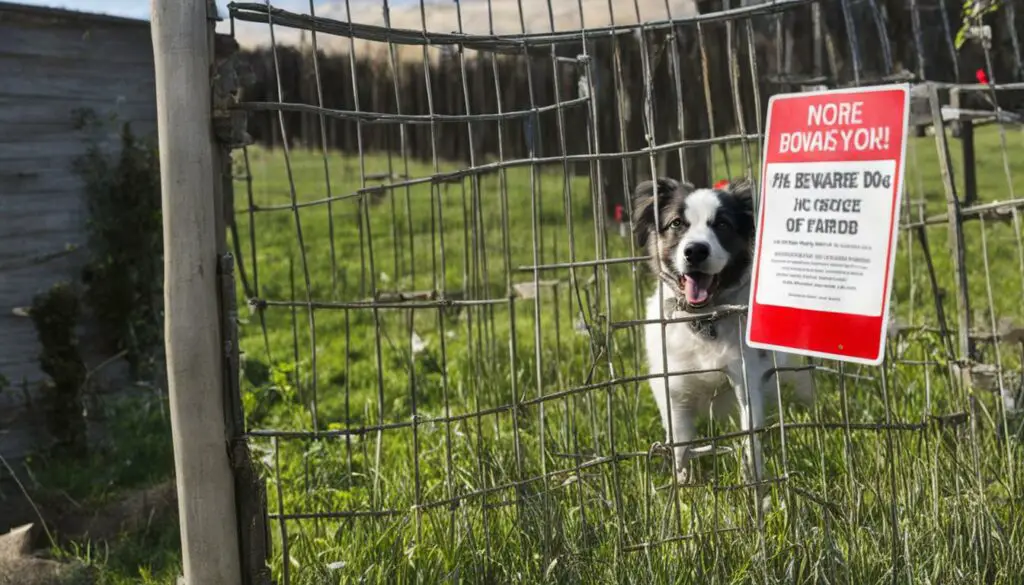
Reporting the Incident to Authorities
When all attempts to resolve the issue with your neighbor fail, it may be necessary to report the incident to local animal control authorities. Reporting the incident is crucial to ensure the safety of yourself and your neighbors, as well as to enforce the regulations in place.
Make sure to gather documented evidence and detailed information about the incidents you have experienced. This may include photographs, videos, or written accounts of the dog charging on your property. Providing accurate and thorough information will help the authorities understand the severity of the situation and take appropriate action.
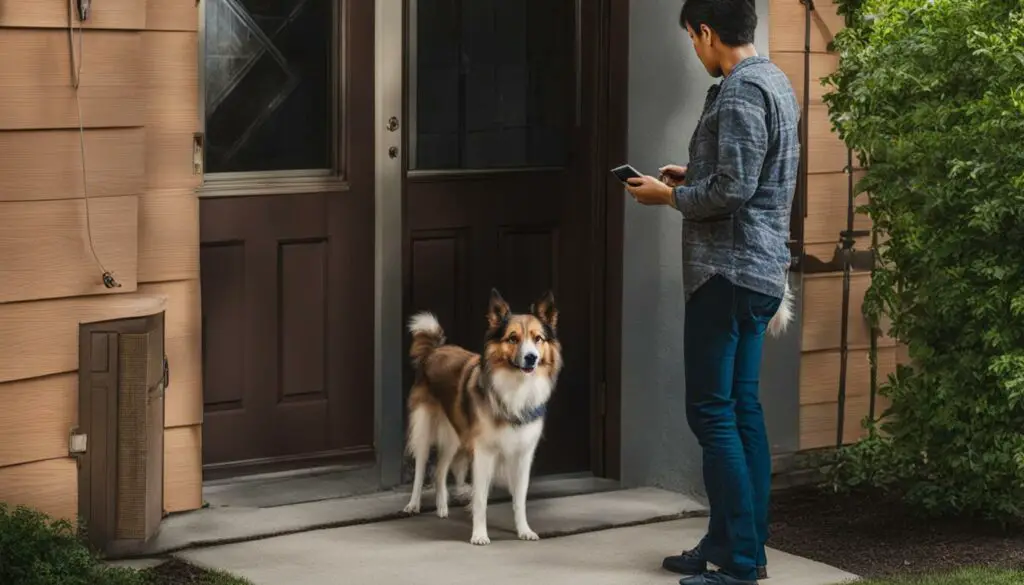
When reporting the incident, be prepared to provide the following information:
- Date and time of the incidents
- Description of the dog and its behavior
- Any injuries or damages caused
- Details of previous attempts to address the issue with your neighbor
Your cooperation with the authorities is essential in ensuring that appropriate measures are taken to prevent further incidents and maintain safety within your community. By reporting the incident, you are advocating for the well-being of not only yourself but also others who may be affected by the aggressive behavior of the neighbor’s dog.
Finding Support in Your Community
Dealing with a neighbor’s aggressive dog can be emotionally challenging. When faced with such incidents, it is important to seek support from your community. Friends, family, and local resources can provide guidance, empathy, and advice based on their own experiences. Sharing your concerns and discussing possible solutions with others who have faced similar situations can help alleviate some of the stress associated with neighbor disputes and dealing with aggressive neighbors.
Community support can come in various forms. It may involve reaching out to local neighborhood associations or online groups where you can find individuals who have dealt with similar issues. These communities can provide valuable insights into managing conflicts, understanding local regulations, and finding resources that can aid in resolving the situation.
It is essential to approach your community with an open mind and willingness to listen. By engaging in respectful and constructive conversations, you can foster a sense of collaboration and unity among neighbors. Together, you can work towards creating a safe and harmonious environment for everyone, including pets and their owners.
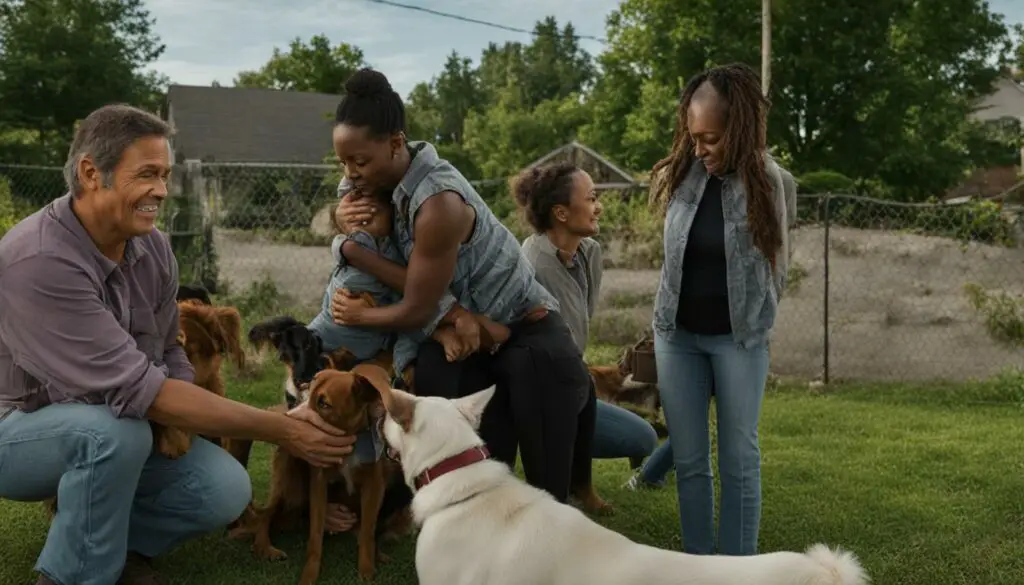
Finding Support in Your Community
Dealing with a neighbor’s aggressive dog can be emotionally challenging. Seek support from friends, family, and local community resources. Share your experiences and concerns with others who may have faced similar situations. They can provide guidance, empathy, and advice on navigating the complexities of neighbor disputes and dog-related incidents.
Future Prevention: Promoting Responsible Pet Ownership
As a responsible pet owner, I believe it is essential to promote a culture of responsible pet ownership within our community. By taking proactive steps and encouraging our neighbors to do the same, we can prevent incidents of dogs charging on our properties and create a safer and more harmonious neighborhood.
Why Responsible Pet Ownership Matters
Responsible pet ownership goes beyond simply providing food, shelter, and medical care for our furry friends. It encompasses a range of responsibilities, including keeping our dogs properly leashed or contained within our property, training them to behave appropriately in different situations, and ensuring they are well-socialized with other dogs and humans.
By adhering to these responsibilities, we can minimize the chances of our dogs charging onto our neighbors’ properties and potentially causing harm or distress. It is also important to clean up after our pets, as unattended waste can not only create an unpleasant environment but also contribute to the spread of diseases. By being responsible pet owners, we show respect for our neighbors and foster a positive relationship within our community.
Ways to Promote Responsible Pet Ownership
There are several ways we can promote responsible pet ownership in our community. Educating ourselves and others about local regulations and leash laws is crucial. By understanding and following these regulations, we can ensure that our dogs are always under our control and prevent them from trespassing onto others’ properties.
Organizing community events and workshops focused on responsible pet ownership can also be effective. These events can provide valuable information on training techniques, proper leash handling, and the importance of socialization. They offer an opportunity for pet owners to connect, share experiences, and learn from one another, fostering a sense of unity and shared responsibility within the community.
The Benefits of Responsible Pet Ownership
Promoting responsible pet ownership not only benefits our immediate community but also has broader, long-term effects. By ensuring our dogs are well-behaved and under control, we contribute to a safer environment for everyone. This, in turn, helps to reduce incidents of dog charging and the potential for conflicts with our neighbors. By being responsible pet owners, we set an example for others and encourage them to follow suit, creating a positive ripple effect throughout the community.
By embracing responsible pet ownership, we can build a community where dogs and their owners coexist peacefully, fostering a sense of harmony and ensuring the safety and well-being of all residents.
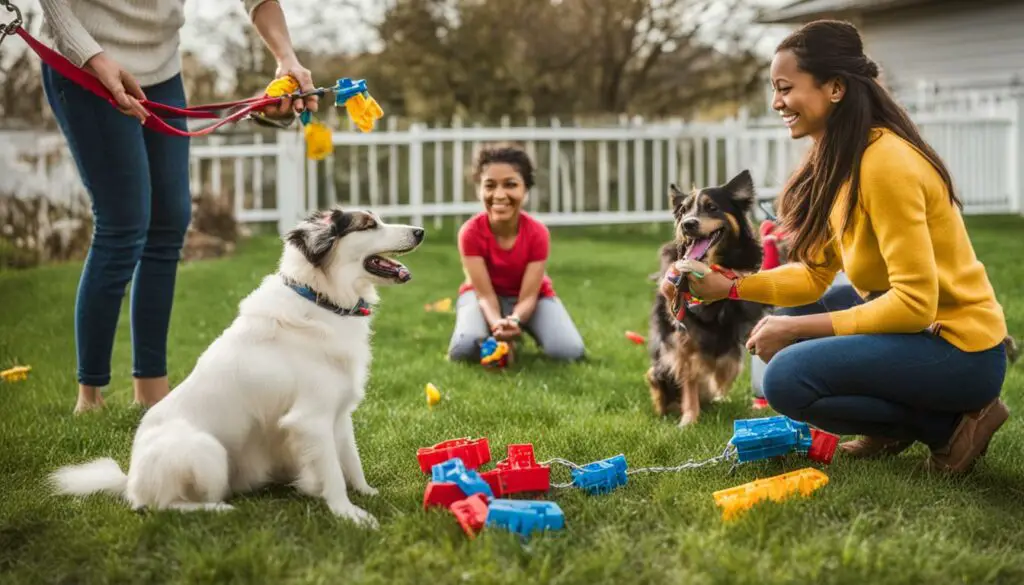
Educating Yourself as a Pet Owner
As a pet owner, it is crucial to continuously educate yourself about various aspects of responsible pet ownership. This includes understanding property safety, dealing with aggressive dogs, and staying updated on local regulations. By staying informed, you can ensure the well-being of your pet and maintain a harmonious relationship with your neighbors.
One important aspect of educating yourself as a pet owner is prioritizing property safety. Familiarize yourself with leash laws and property boundaries in your area to prevent your pet from trespassing onto others’ properties. Additionally, ensure that your fencing is secure and that your pet is always supervised when outside. By taking these precautions, you can avoid conflicts with neighbors and promote a safe environment for everyone.
Dealing with aggressive dogs is another area where education is crucial. Familiarize yourself with dog behavior and learn to recognize signs of aggression. This knowledge will help you respond appropriately if your pet encounters an aggressive dog during walks or other outdoor activities. It is also essential to socialize your dog properly to prevent aggressive behavior and promote a positive interaction with other animals.
Lastly, make it a habit to stay updated on local regulations and resources related to pet ownership. Attend community events, workshops, and seminars on responsible pet ownership to learn new techniques and gain valuable insights. By continuously educating yourself, you can stay informed about the best practices for pet care and be a responsible and informed member of your community.
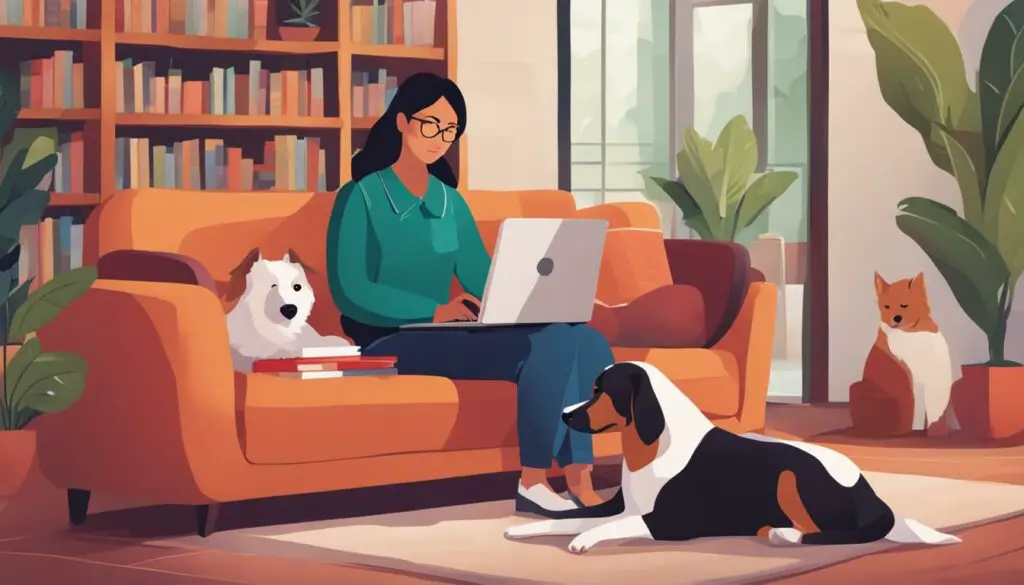
Conclusion
Dealing with a neighbor’s dog charging on your property can be a distressing experience, but there are steps you can take to address the issue and ensure your safety. Understanding your legal rights as a property owner is crucial, as laws regarding dog ownership and property boundaries can vary. Consult with local authorities and legal professionals to navigate the specific regulations in your area.
When faced with a charging dog, prioritize your safety by finding a secure location and avoiding sudden movements. Document the incident for future reference if needed. Communicating with your neighbor in a friendly and non-confrontational manner can help find a resolution. Consider exploring local regulations and reaching out to animal control authorities if necessary.
Enhancing security measures on your property can provide added protection, while seeking mediation or legal intervention may be required in more severe cases. It’s important to ensure your own dog’s safety through proper training and socialization. Reporting the incident to local authorities can be necessary if all else fails. Remember, finding support in your community and promoting responsible pet ownership are key to fostering a peaceful neighborhood.
FAQ
What should I do if a neighbor’s dog charges at me on my property?
Prioritize your safety by finding a secure location and avoiding sudden movements or running. Once safe, document the incident and consider approaching the neighbor in a friendly manner to address the issue.
What are my legal rights as a property owner in such situations?
Laws regarding dog ownership and property boundaries can vary, but in many cases, property owners have the right to protect their property and ensure their own safety. Consult with local authorities and legal professionals to understand the specific regulations in your area.
How should I approach my neighbor about their dog’s behavior?
Approach your neighbor in a friendly and non-confrontational manner. Express your concerns about the dog’s behavior, explain how it has affected your sense of safety, and offer potential solutions such as keeping the dog leashed or properly fenced.
What should I do if my neighbor refuses to address the issue?
If attempts to resolve the issue amicably fail, consider seeking mediation or legal intervention. Mediation can help facilitate a conversation with the assistance of a neutral third party, while consulting an attorney specializing in property and animal law can provide guidance on potential legal actions.
What steps can I take to ensure my own dog’s safety?
Proper socialization and training can help your dog react appropriately in situations involving other dogs. Teaching reliable recall and improving social skills can reduce the chances of a negative outcome if your dog encounters an aggressive or off-leash dog in the future.
When should I report the incident to animal control authorities?
If all attempts to resolve the issue fail and your neighbor continues to disregard leash laws and place your safety at risk, it may be necessary to report the incident to local animal control authorities. Provide documented evidence and detailed information about the incidents you have experienced.
How can I find support in my community for dealing with this situation?
Seek support from friends, family, and local community resources. Share your experiences and concerns with others who may have faced similar situations. They can provide guidance, empathy, and advice on navigating neighbor disputes and dog-related incidents.
What can I do to promote responsible pet ownership within my community?
Encourage neighbors to leash their dogs, properly fence their yards, and take necessary precautions to prevent their dogs from trespassing on others’ properties. Promoting awareness and education around responsible pet ownership can create a safer and more harmonious neighborhood.
How can I educate myself about local regulations and responsible pet ownership?
Stay updated on leash laws, training techniques, and resources available to address behavioral issues in dogs. By being knowledgeable and proactive, you can better protect yourself, your dog, and promote a positive relationship with your neighbors.

